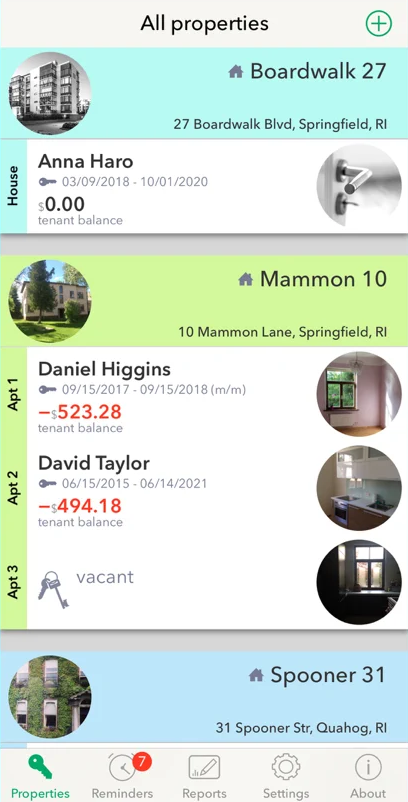The Best Property Management Apps
Get the best software for your business. Compare product reviews, pricing below.
Property management systems allow landlords and property owners to handle their work, from collecting tenant rent to scheduling maintenance services, all with one easy-to-use digital platform.
What are Property Management Apps?
Property management applications are systems tailored specifically for use on iOS or Android mobile devices. App-based online property management software increases your mobility when performing basic tasks such as tenant screenings, rent collection, and work order management. These easily accessible solutions are ideal for property managers who want to save time and money on installation as anyone with a smart device can download the application with the press of a few buttons.
These apps are capable of operating online or offline, depending on circumstances. Any real estate manager with a smartphone or tablet can now confirm payments, communicate with tenants, and use automated alerts to check lease renewals. As mobile apps, landlords, realtors, and property managers can perform all these duties while in the field without the need for going back to an office to log into a computer.

Features of Property Management Apps
- Online property listings: Manage online real estate listings for your properties, modifying availability as necessary
- Digital rental applications: Accept completed rental applications from potential tenants through a digital form
- Tenant screening process: Automate screening and background checks for prospective tenants, collect all relevant information into one accessible platform
- Rent collection: Let tenants securely pay rent and other fees online via credit card or bank account transfer; allow renters to set up recurring payments
- Online customer, resident, or tenant portals: App-accessible portals allow renters and tenants alike to view their lease agreements, communicate with management, submit or modify maintenance requests, and pay rent or other charges from a mobile device
- Online owner or landlord portals: Owner portals allow the property manager, landlord, or agency to track maintenance status, run real-time reports on vacancies, collect rental payments, and more
- Maintenance tickets: Generate maintenance tickets for tenants and residents to know when they can expect work to be done
- Work order management: Process maintenance requests from tenants by categorizing urgency and assigning contracts to the repair jobs; schedule preventative maintenance for your properties in advance of annual inspections
- Lease management: Review existing lease agreement terms and modify lease renewals for current tenants; automatically apply late fees to overdue rent payments or tenants who have broken a lease agreement
Best Property Management Apps Benefits
Adding mobile apps to your online property management system has many benefits for your business, including:
Easier Access to Property Management Tools
The primary benefit of property management apps is the ability to gain access to your property management system anytime and anywhere. By using an app, you can update a property listing in real-time while showing another property to a tenant on the other side of town. Previously, you would have to wait until you could access a desktop computer in order to remove a rental property from your site. An app makes it possible in an instant.
As technology increases, property management apps can add more and more of the main services necessary for running a rental business. You no longer have to be tied to a desk in order to do your job. Approve a lease renewal offer while checking out your property, or check in with a maintenance team to ensure a work order has been completed.
These advantages apply to tenants as well, who can now make online payments through an app or request maintenance services.
Real-Time Updates for Tenants and Landlords
Apps allow users to gain real-time information about maintenance requests, payment processing, and other communications. Want to confirm a new lease with a prospective tenant? Do it through the app for instant results! No more waiting hours or days for a response when potential renters can receive updates through app notifications. This is particularly useful for any landlord who has to work around business hours or holidays making communication difficult.
A major hassle for tenants and landlords alike is knowing when in-house or third-party maintenance work will be done. By using an app, all parties can stay in contact throughout the duration of the project. Tenants can log-in whenever they want to report issues as they occur. Automated maintenance tickets are then sent to the relevant contractors to complete while informing management of the active work order.
Shorter Vacancies and Longer Leases
Utilizing apps for your property management services can be a great draw to new and current renters. Automated reminders sent right to your mobile device to let you know when units are 30-60 days from a lease expiring, allowing you to start the renewal process with a current tenant or prepare a listing for the market.
Current renters who are happy with your services are more likely to renew their leases or recommend vacancies to friends and family. Convenient communication and service through an app is one positive feature which can make your rental opportunities stand out among the competition.
How Property Management Apps Compare to Online Software
Property management apps offer a lot of the same features as property management software. In fact, many online property management solutions offer custom applications compatible with most mobile devices. These hybrid systems allow landlords and tenants to access some information from a traditional desktop setup or use an app, depending on what services they need.
Some property management companies may prefer to use desktop-only solutions to handle their workload. This may be a matter of personal preference. In other cases it may be a way to keep data from different properties organized. For example, a landlord with multiple tenants across different apartment complexes may not want to use an app to organize all lease agreements. Instead, they may prefer using a desktop application or web browser to organize leases based on the specific factors of each property.

